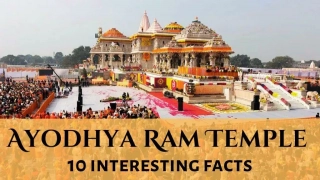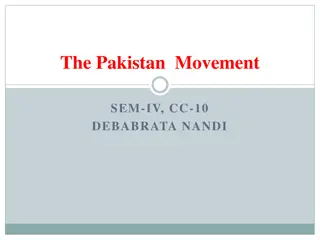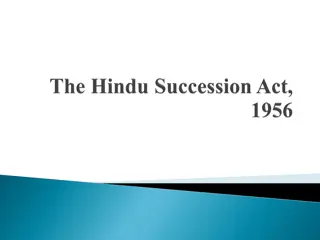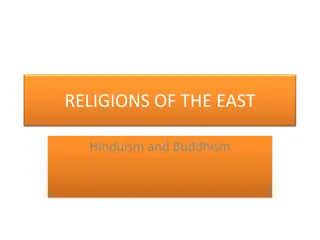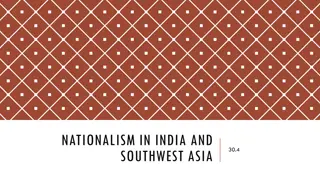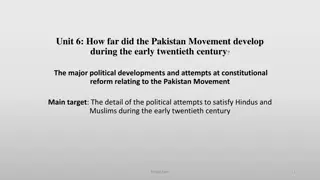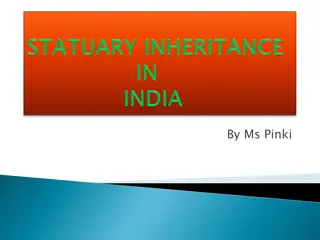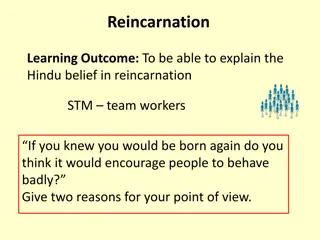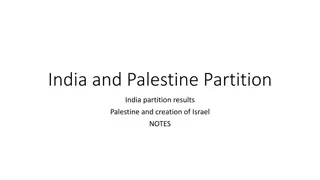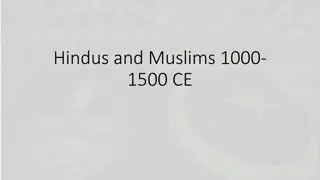Ram Temple In Ayodhya: Interesting Facts
The Ram temple in Ayodhya was inaugurated on Monday (January 22, 2024) at a grand ceremony, which was attended by Prime Minister Narendra Modi and other dignitaries. The affairs of the temple are managed by Shri Ram Janmabhoomi Teerth Kshetra. It is considered as one of the most important pilgrimage
3 views • 20 slides
The Pakistan Movement
The Pakistan Movement, spearheaded by figures like Sir Syed Ahmed Khan and Muhammad Ali Jinnah, advocated for the creation of a separate Muslim state due to perceived cultural and religious differences with Hindus. The Two Nation Theory, posited by Sir Syed, emphasized the distinct identities of Hin
0 views • 15 slides
Uttarakhand Tourism
Uttarakhand is home to the Char Dhams, the four most holy sites of pilgrimage revered by the Hindus - Gangotri, Yamunotri, Kedarnath, and Badrinath.
3 views • 1 slides
Top Places Visit In Uttarakhand
Uttarakhand is home to the Char Dhams, the four most holy sites of pilgrimage revered by the Hindus - Gangotri, Yamunotri, Kedarnath, and Badrinath.
2 views • 6 slides
The Power of Prayer: A Glimpse into Abdul Kalam's Childhood
Explore Abdul Kalam's early life, upbringing, and the harmonious coexistence of Hindus and Muslims in his community, reflecting on the influence of his parents and the values instilled in him. Witness how Kalam's formative years shaped his character and worldview.
1 views • 9 slides
Language Controversy and Political Awakening in Colonial India
Urdu-Hindi language controversy in colonial India sparked a significant cultural and political divide between Hindus and Muslims, leading to the emergence of the Two-Nation Theory. This controversy, along with events like the formation of the Indian National Conference, highlighted growing tensions
0 views • 45 slides
Rath Yatra: A Hindu Chariot Festival
Rath Yatra is a significant Hindu festival where devotees come together to celebrate the chariot festival of the deities in Puri, India. The event is steeped in tradition and attracts millions of pilgrims annually. The festival holds deep religious and cultural importance for Hindus worldwide.
0 views • 5 slides
The Hindu Succession Act of 1956
The Hindu Succession Act of 1956 establishes a comprehensive system of laws governing the succession and inheritance of property for Hindus, Buddhists, Sikhs, and Jains in India. It covers both intestate and testamentary succession, outlining rules for agnates, cognates, heirs, and different types o
0 views • 10 slides
Causes and Effects of the 1857 War of Independence in India
Politically, the Doctrine of Lapse and mistreatment of local Indian leaders contributed to the uprising. Religious tensions arose due to British interference and social inequality. Economically, high taxes and exploitation of Indian wealth fueled the discontent. The military also played a significan
1 views • 17 slides
Hinduism: Gods, Beliefs, and Practices
Hinduism, a diverse and ancient religion, encompasses a rich tapestry of beliefs, deities, and spiritual practices. Rooted in the concept of Brahman as the unchanging force in the universe, Hinduism reveres a pantheon of gods like Brahma, Vishnu, and Shiva. The ultimate goal for Hindus is to achieve
0 views • 60 slides
Family Laws and Marriage Legalities in Pakistan
The legal system of Pakistan blends English common law and Islamic law, influencing various aspects such as commercial and personal laws. Family laws in Pakistan are a mix of codified and customary laws, with different laws applicable to different religious communities. Specific laws govern marriage
0 views • 21 slides
Nationalism in India and Southwest Asia: A Historical Overview
The aftermath of World War I led to a surge in nationalism in India and certain Southwest Asian countries, as empires like the Ottoman Empire and the British Empire showed signs of weakening. Indian nationalism grew due to factors such as promises of reform by the British, religious divisions, and e
0 views • 15 slides
Development of the Pakistan Movement in the Early 20th Century
The Pakistan Movement in the early 20th century saw significant political developments, including the formation of the Indian National Congress, the Partition of Bengal, and key events like the Lucknow Pact and the Amritsar Massacre. The movement reflected the growing demands of both Hindus and Musl
0 views • 21 slides
The Laws of Succession in India
The laws of succession in India govern how a deceased person's property is inherited. Various methods such as wills, gift deeds, joint ownership, and partnership arrangements determine inheritance. Different laws apply to different communities like Hindus, Muslims, Parsis, Christians, and Jews. The
0 views • 20 slides
Hindu Belief in Reincarnation
Hinduism teaches the belief in reincarnation, where the soul moves to another being after death. Through understanding stages of life and karma, Hindus strive to move up in the cycle of samsara towards Moksha, the liberation of the soul. This cycle is based on the concept of karma, actions that impa
0 views • 10 slides
Impact of Partition on India and Palestine
The partition of India and Palestine had significant consequences, including mass movements of people, chaos, riots, and violence. The partition resulted in the creation of India and Pakistan, leading to the migration of millions of Muslims to West Punjab in Pakistan and Hindus/Sikhs to East Punjab
0 views • 12 slides
Beliefs in Different Religions
Christians, Muslims, Hindus, Jews, Sikhs, Buddhists, and Humanists each hold distinct beliefs about the concept of God or a higher power. While Christians hold God as the creator of all things, Muslims believe Allah is beyond human portrayal. Hindus worship Brahma along with other gods, Jews worship
0 views • 7 slides
Hindus and Muslims 1000-1500 CE
The historical period from 1000 to 1500 CE witnesses significant interactions between Hindus and Muslims, shaping religious, cultural, and political landscapes. This era marked instances of conflict, cooperation, and cultural exchanges, influencing societal dynamics and historical developments in th
0 views • 11 slides
The Last Command - Matthew 28:16-20
The Last Command from Matthew 28:16-20 emphasizes the importance of spreading the Gospel and making disciples of all nations. The images and messages highlight the mission of the Church of Jesus Christ as a community of truth, grace, prayer, and praise. It challenges believers to share the message o
0 views • 28 slides
